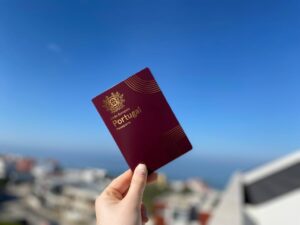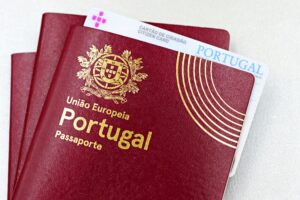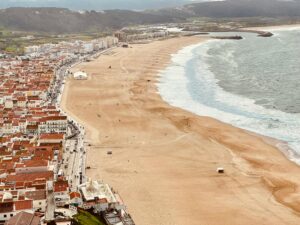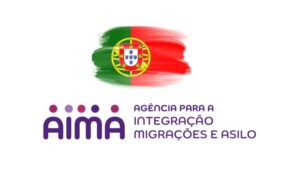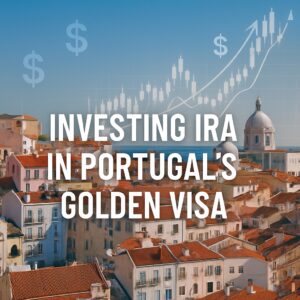Portugal has emerged as a global hotspot for cryptocurrency enthusiasts and investors, thanks to its progressive crypto-friendly policies, favorable tax regulations, and innovative Golden Visa opportunities. Known for its stunning landscapes, rich cultural heritage, and investor-friendly climate, Portugal offers not only a high quality of life but also one of the most attractive environments for cryptocurrency trading and investment.
Ranked among the top 10 countries in Henley & Partners’ Cryptocurrency Adoption Index, Portugal stands out as a haven for those looking to trade Bitcoin and other digital assets, secure tax benefits, and even obtain residency through crypto-related investments. Whether you’re exploring tax-free crypto trading, investing in Bitcoin-linked Golden Visa funds, or planning to move to Portugal with your crypto portfolio, this guide will show you how to unlock the full potential of Portugal’s crypto ecosystem.
Is Cryptocurrency Legal In Portugal?
Yes, cryptocurrency is fully legal in Portugal, making it one of the most crypto-friendly countries in Europe. The country offers a supportive, transparent, and stable regulatory environment for buying, selling, and trading cryptocurrencies. This crypto-friendly approach not only attracts investors but also solidifies Portugal’s reputation as a leading hub for blockchain innovation and digital asset trading.
Portugal’s journey toward becoming a cryptocurrency haven began in 2016, when the government issued its first tax guidelines for cryptocurrency. These guidelines clearly stated that individuals engaging in non-professional cryptocurrency trading are exempt from capital gains tax. This tax policy remains one of the most attractive features for crypto investors.
In 2017, Banco de Portugal (the Portuguese Central Bank) took significant steps to regulate cryptocurrency-related institutions in accordance with international anti-money laundering (AML) standards. The Portugal crypto regulation enhanced the legitimacy and security of the industry, encouraging more investors and businesses to establish themselves in this country. Today, Portugal is recognized as a leader in cryptocurrency adoption and regulation in Europe.
Cryptocurrency Trading Platforms in Portugal
Portugal offers a wide range of trading platforms that cater to both experienced investors and newcomers. These platforms include international exchanges as well as homegrown exchange options catering to beginners and advanced traders.
| International Cryptocurrency Exchanges | Portuguese Local Licensed Exchanges |
| Bitpanda Kraken OKX Gate.io Uphold | Criptoloja Mind the Coin Luso Digital Assets Utrust Bison Ativos Digitais |
With these platforms, investors gain access to a secure and regulated trading environment, ensuring peace of mind as they manage their cryptocurrency portfolios.
What Trading Advantages Does Portugal Offer for Cryptocurrencies?
As mentioned, Portugal is at the forefront of cryptocurrency adoption, offering a unique combination of low tax policies, a booming crypto ecosystem, and high participation rates. These factors make it a haven for both individual investors and businesses looking to thrive in the cryptocurrency market.
Low Tax Policy for Cryptocurrencies
Portugal’s tax framework for cryptocurrencies is one of the most attractive and transparent in Europe, distinguishing between individual investors and professional traders. This favorable environment allows investors to benefit from reduced tax burdens and flexible portfolio management.
Key Tax Advantages for Traders:
- Long-term holding tax exemption: Capital gains from cryptocurrencies held for more than one year (non-commercial in nature) are completely tax-free.
- Flexible portfolio adjustments: Cryptocurrency-to-cryptocurrency exchanges are not immediately taxed, enabling investors to optimize strategies without incurring immediate tax liabilities.
- Unified passive income tax rate: Passive income, such as staking, lending, and airdrops, is taxed at a uniform rate of 28%, simplifying the declaration process.
- Occasional trading tax exemption: Individuals engaging in occasional or non-professional trading are generally exempt from transaction taxes, provided the activities are not classified as commercial or professional.
Portugal’s Cryptocurrency Tax Law
The 2023 national budget reform officially integrated cryptocurrencies into the Portuguese Tax Administration (IRS – Imposto sobre o Rendimento das Pessoas Singulares), establishing the following tax categories:
- Category G:
- Short-term capital gains (assets held for less than 365 days) are taxed at 28%.
- Long-term holdings (more than 365 days) are tax-free unless classified as securities or assets held outside the European Economic Area (EEA).
- Category E: Passive income from staking, airdrops, or lending is taxed at a uniform rate of 28%.
- Category B: Professional or business income (e.g., mining, frequent trading) is taxed progressively, ranging from 14.5% to 53%, with an option for simplified accounting declarations.
A Booming Crypto Ecosystem
Portugal’s active and rapidly growing blockchain and cryptocurrency ecosystem has attracted investors, startups, and enthusiasts from around the world. This vibrant environment fosters innovation and collaboration in the crypto space.
The Prosperity of Local Startups
Portugal is home to numerous pioneering startups leading innovation in cryptocurrency and blockchain technology. These include:
- Polkastarter: A decentralized fundraising protocol that helps startups raise capital quickly and enter the market with ease.
- Guarda: A platform offering secure wallet and staking services, enabling seamless digital asset management.
- Phantasma: A Layer-1 blockchain specializing in high-performance decentralized applications (dApps) for entertainment and gaming industries.
Major Events and Community Support
Portugal regularly hosts globally renowned blockchain and cryptocurrency events, further solidifying its position as a hub for innovation:
- Ethereum Lisbon: Focuses on Ethereum technology, attracting developers and blockchain experts.
- Web Summit: One of the world’s largest technology events, with cryptocurrency and blockchain as key themes.
- Rare Effect: Dedicated to NFTs, this event connects artists and collectors while showcasing blockchain’s applications in the art world.
These events foster collaboration, drive innovation, and strengthen Portugal’s ties with the global blockchain community.
Government Support and Innovation Policies
The Portuguese government actively supports cryptocurrency and blockchain development through strategic policies:
- Innovation “Free Zone”: Under the Digital Transitional Action Plan, Portugal has created pilot zones where companies can test new technologies and business models in a flexible regulatory environment.
- Virtual Asset Service Providers (VASPs) License: Issued since 2021, this license supports the legal operation of crypto exchanges and startups, enabling them to gain legal status quickly.
High Cryptocurrency Participation
Portugal boasts one of the highest cryptocurrency participation rates in Europe. According to the “Blackrock People & Money 2024” survey, 43% of Portuguese investors hold cryptocurrencies, nearly double the EU average of 22%. This high participation reflects the nation’s widespread acceptance of digital assets and its dynamic market environment.
In addition to its crypto-friendly policies, Portugal’s Golden Visa program has further enhanced its appeal to international investors and entrepreneurs. Offering flexible investment options, a high standard of living, and a low cost of living, Portugal attracts digital nomads and cryptocurrency professionals alike. These factors collectively promote the use and circulation of cryptocurrencies, positioning Portugal as a key player in the global crypto market.
Can Foreigners Move to Portugal with Crypto?
Absolutely! Foreigners can move to Portugal by leveraging income or investments from cryptocurrency, thanks to the country’s crypto-friendly policies and flexible visa programs. Two popular options for residency are the Portugal Golden Visa and the D7 Visa. The D7 Visa is perfect for individuals with passive income while the Golden Visa offers a residency pathway through qualifying investments. Let’s dive into the details!
Portugal Golden Visa: Cryptocurrency Investment Immigration Program
The Portugal Golden Visa Program is a globally recognized investment immigration option that offers a pathway to European residency. This program not only provides access to Portugal’s high quality of life but also allows investors to explore innovative opportunities in cryptocurrency while benefiting from favorable tax policies and visa-free travel across the Schengen Area.
Innovative Investment Options: Bitcoin-Linked Golden Visa Funds
Portugal has gone beyond merely supporting cryptocurrency trading by introducing innovative investment opportunities such as Bitcoin-linked Golden Visa funds. These funds combine the benefits of cryptocurrency investments with Portugal’s Golden Visa program, allowing high-net-worth individuals to diversify their portfolios while gaining residency in Portugal.
Here are two leading Bitcoin-linked Golden Visa funds, both officially registered with the Portuguese Securities Market Supervisory Authority (CMVM):
Note: Please note that to be eligible for Golden Visa, the fund must invest at least 60% in Portugal.
- Horizon Fund
- The first Golden Visa fund to integrate fixed income (65%) with digital assets like Bitcoin (35%).
- Offers an estimated risk-adjusted internal rate of return (IRR) of 15%-20%, making it an attractive choice for investors seeking high returns.
- 3CC Fund
- Focuses on diversified investments, including stocks, bonds, and Bitcoin, creating a balanced portfolio.
- Designed to minimize risks while maximizing returns through diversification.
These funds provide a unique opportunity for investors to capitalize on the thriving cryptocurrency market while securing the residency and lifestyle benefits of Portugal’s Golden Visa program.
Investment Fund Conditions
- Minimum investment: €500,000.
- Eligible Fund: At least 60% of the fund must be invested in Portuguese companies.
- Minimum holding period: 5 years.
- Regulation: The fund must be registered with the Portuguese Securities Market Supervisory Authority (CMVM).
This makes the Golden Visa highly attractive for those seeking a secure and regulated investment opportunity.
Example of Cryptocurrency-Focused Investment Funds
While traditional funds often focus on sectors such as tourism, agriculture, and technology, a new wave of innovative funds includes cryptocurrency investments. One notable example is the Golden Crypto Fund, which combines lower risk fixed-income assets with investments in Bitcoin and Bitcoin ETFs (Exchange Traded Funds).
Key highlights of this fund include:
- Target annual return: 10%–20%.
- Regulation: Fully regulated by the CMVM.
- Risk profile: Moderate, making it suitable for professional and well-informed investors.
This fund offers a unique opportunity to combine the benefits of Portugal’s Golden Visa program with the growth potential of cryptocurrency investments.
Golden Visa Application Process
The Golden Visa application typically involves the following steps:
- Obtain your NIF (tax ID) and open bank account in Portugal
- Select a fund or funds that meets the program’s criteria.
- Submit your application with all required documents.
- Come to Portugal for to submit biometric appointment and pay the card issuing fees.
- Receive final approval and get your resident card.
Once approved, investors can enjoy the benefits of Portuguese residency, including the right to live, work, and study in Portugal, as well as access to visa-free travel within the Schengen Area.
For a comprehensive guide on eligibility, documentation, and other details, refer to the Portugal Golden Visa Guide.
Portugal D7 Passive Income Visa: Cryptocurrency Program
For another option, the Portugal D7 Visa offers an excellent pathway for individuals with stable passive income to reside in Portugal. This visa is suitable for those who are planning to move to Portugal full time and make Portugal their home!
Eligible Passive Income Sources
The D7 visa recognizes the following as valid sources of passive income:
- Pensions
- Rental income
- Dividends
- Interest income
- Royalties
Additionally, cryptocurrency income (such as staking rewards, lending income) may qualify as passive income, provided it meets specific criteria. Such income must be stable, consistent, and verifiable to satisfy the visa requirements.
How to Prove Cryptocurrency Income
If you intend to use cryptocurrency income to meet the D7 visa’s requirements, you’ll need to present the following documents:
- Transaction Records: Provide detailed transaction histories from exchanges and wallets to trace the source and flow of funds.
- Tax Documentation: Submit relevant tax filings that report cryptocurrency income to the Portuguese tax authorities.
- Bank Statements: Include statements showing cryptocurrency income converted into fiat currency, confirming its authenticity.
- Contracts or Agreements: Share agreements or contracts related to staking, lending, or other crypto-related activities to validate the source of income.
Given the volatility of cryptocurrency markets, it’s crucial to provide comprehensive documentation to demonstrate the stability of your income. Engaging a professional accountant or financial advisor can help ensure compliance with Portuguese regulations, thereby increasing your application’s success rate.
D7 Visa Application Timeline
On average, the process to obtain a residence card under the D7 visa takes approximately 9 months. For a complete guide on the application process, visit the Portuguese D7 Visa Guide .
Take Action Now – Seize the Opportunities in Portugal
Portugal offers a unique combination of crypto-friendly regulations, flexible tax policies, and stable legal frameworks, making it a top destination for global investors and cryptocurrency enthusiasts. Through its investment immigration and residency programs, such as the Golden Visa and D7 Visa, applicants can leverage cryptocurrency investments or passive income from crypto to fulfill residency requirements.
The benefits of these programs extend beyond residency, offering access to Portugal’s pleasant climate, diverse culture, and high standard of living. Furthermore, they open the door to the European market and allow investors to enjoy tax advantages while participating in Portugal’s innovative ecosystem.
Why Act Now?
With growing interest in Portugal’s investment immigration programs, now is the perfect time to secure your residency and explore the numerous opportunities Portugal offers.
For tailored guidance and further information, contact us at Golden Portugal and start your journey today!



